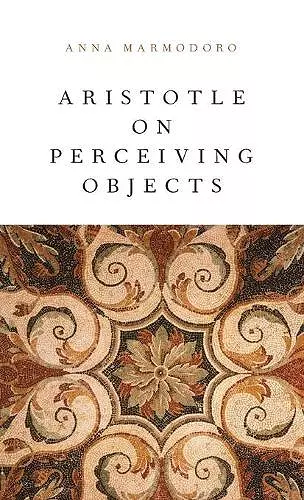Aristotle on Perceiving Objects
Format:Hardback
Publisher:Oxford University Press Inc
Published:21st Aug '14
Currently unavailable, and unfortunately no date known when it will be back

How can we explain the structure of perceptual experience? What is it that we perceive? How is it that we perceive objects and not disjoint arrays of properties? By which sense or senses do we perceive objects? Are our five senses sufficient for the perception of objects? Aristotle investigated these questions by means of the metaphysical modeling of the unity of the perceptual faculty and the unity of experiential content. His account remains fruitful-but also challenging-even for contemporary philosophy. This book offers a reconstruction of the six metaphysical models Aristotle offered to address these and related questions, focusing on their metaphysical underpinning in his theory of causal powers. By doing so, the book brings out what is especially valuable and even surprising about the topic: the core principles of Aristotle's metaphysics of perception are fundamentally different from those of his metaphysics of substance. Yet, for precisely this reason, his models of perceptual content are unexplored territory. This book breaks new ground in offering an understanding of Aristotle's metaphysics of the content of perceptual experience and of the composition of the perceptual faculty.
Marmodoro has done exemplary work in bringing us closer to understanding the details of Aristotle's theory of perception ... Her work will be necessary reading for anyone interested in the philosophy of perception, and by putting it into the context of contemporary power metaphysics she has made Aristotleâs theory of more than antiquarian interest. * Scott Carson, Bryn Mawr Classical Review *
The book is thoughtfully organized, written in a clear and lively style, and aimed at an audience that includes both contemporary philosophers and scholars of Aristotle alike. It provides an excellent introduction to many issues that have not gotten the extended and focused discussion they deserve. Very few books are the last word on a topic. But not all do the field a service, as Marmodoro's does, by stimulating further debate. * Victor Caston, Journal of the History of Philosophy *
... this book offers a well detailed and original analysis of the metaphysical foundations of the Aristotelian conception of perception, and the content is very clear and very useful for those who want to examine in depth this important aspect of Aristotelian thought. * Giacomo Borbone, Philosophy in Review *
While I have some reservations about Marmodoroâs treatment of the perception of objects, her treatment of powers in general is excellent, and the work to which she puts them in grounding realism is convincing and illuminating. Moreover, while I am ultimately unconvinced by the robust account of the common sense that she offers, I found her arguments there to be stimulatingâa formidable challenge for future work in the area. * Rosemary Twomey, Australasian Journal of Philosophy *
In Aristotle on Perceiving Objects, she [Marmodoro] aims to provide an accurate interpretation of Aristotle's views about perception, but she also wants to present and defend his account in a way that will aid her contemporaries as they grapple with the very same problems that exercise Aristotle. She succeeds remarkably in both tasks. * Christopher Frey, The Times Literary Supplement *
There is much that is valuable in this book. Marmodoro opens up with great skill and intelligence the world of Aristotle's concerns in these areas, persuasively and illuminatingly presenting them as live issues. She handles comparisons between various competing interpretations of the Aristotelian texts very deftly, and her writing is fluent and vivid. * Metascience *
... the work succeeds in advancing a new approach to Aristotle's theory of perception and perceptual experience relating them to the metaphysical notion of causal powers, offering discussions of interest to advanced student and specialist alike. * Julie K. Ward, Ancient Philosophy *
This is an excellent book on a topic of considerable historical and ongoing philosophical interest. It is well organized and well written, and its central claims and lines of argument are easy to follow. These main claims are frequently highly original, while the problems with competing views are clearly explained. The book reflects a great deal of work and thought by Marmodoro on the topics it treats. It should serve as a touchstone for debates about Aristotle's general theory of causal powers, his perceptual realism, and his views on the unity of the perceptual faculty for many years to come * Mark Johnstone, Notre Dame Philosophical Reviews *
[Marmodoro's] book is written with unusual verve and formidable ambition. It sets out to solve the most difficult problems in Aristotle's theory of perception, and it promises to do so in the best philosophical spirit, namely by cutting reality 'at its joints' at the most fundamental level, which, according to Marmodoro, is the level of the metaphysics of powers. Accordingly, her argument starts with a metaphysical discussion of Aristotle's conception of powers, causation, and change, and then applies the results to his theory of human perception. The outcome is a highly innovative, at times almost dazzling array of fresh, often controversial, and unfailingly thought-provoking, discussions of a whole plethora of issues in Aristotle's metaphysics and theory of perception. * Oxford Studies in Ancient Philosophy *
ISBN: 9780199326006
Dimensions: 145mm x 211mm x 33mm
Weight: 431g
304 pages